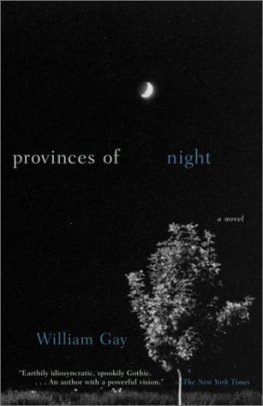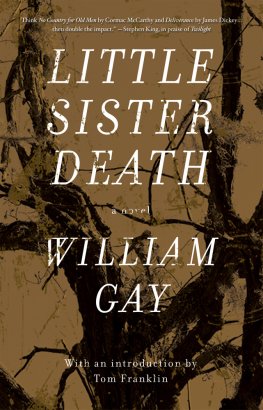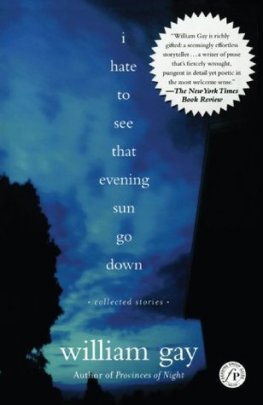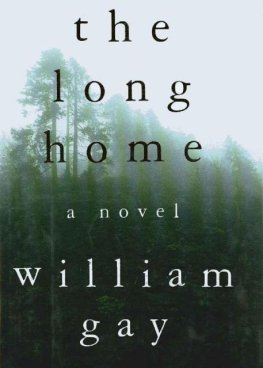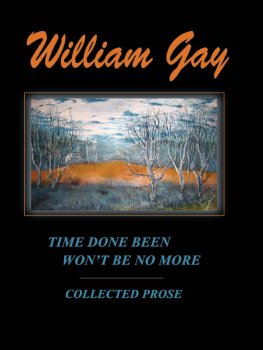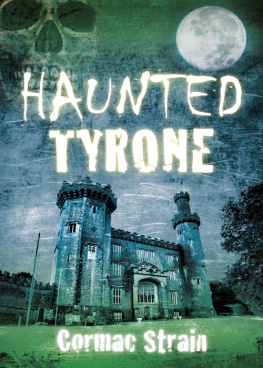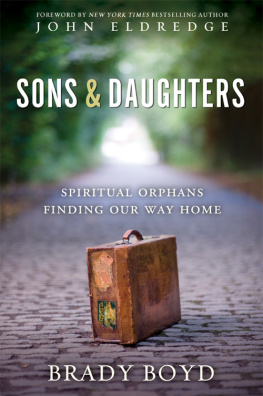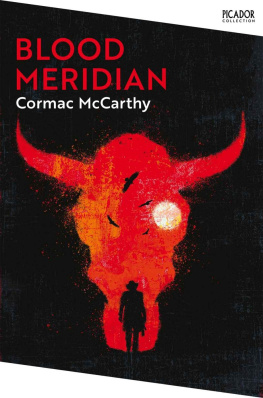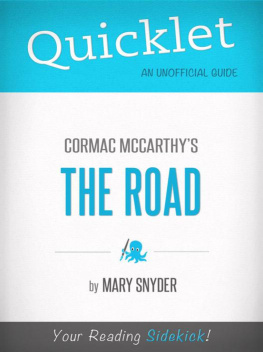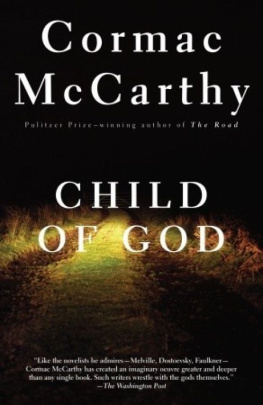William Gay
Provinces of Night
William Gay is the author of the novel The Long Home. His short stories have appeared in Harpers, Atlantic Monthly, GQ, and New Stories from the South 1999 and 2000. The winner of the William Peden Award and the James A. Michener Memorial Prize, he lives in Hohenwald, Tennessee.
This book is for Lee, Chris, and Laura
and William Blake
and for
Renee Leonard
Were there darker provinces of night he would
have found them.
CORMAC MCCARTHY, Child of God, 1973
Sometimes I think youre just too sweet to die
Sometimes I think youre just too sweet to die
Another time I think you oughta be buried alive.
RICHARD RABBIT BROWN, James Alley Blues, 1927
THE DOZER TOOK the first cut out of the clay bank below Hixsons old place promptly at seven oclock and by nine the sun was well up in an absolutely cloudless sky and it hung over the ravaged earth like a malediction.
The superintendent walked over to a white flatbed truck and leaned his numbered gradepole against it. He filled a Pepsi-Cola bottle with ice water from a cooler on the truckbed and drank. He took out a red bandanna and mopped his face and throat. Behind him the scraped bottomland stretched as far as the eye could see like a dead wasteland, a land no one would have. A blue pall of smoke shifted over it and no tree grew, no flower. A bird would not even fly over it.
A swamper named Risner came up carrying a widemouth Mason jar. Its surface was impacted with earth and Risner was mopping at it with the tail of his shirt.
Whatd you find, Risner?
Dozer cut it out on that slope yonder, Risner said. Likely its money. These old folks always used to bury their money in fruit jars.
These old people never had any excess money to put up in fruit jars, the superintendent said. Likely youve found you a antique jar of green beans.
Risner was holding the jar beneath the coolers spout and running water over it.
Youll want that water long about three oclock, the superintendent said.
Risner was mopping the jar with his shirt again. The shirt came away muddy. He was squinting into the jar then the wet jar seemed to slip in his hands and shattered between his workboots.
What the hell is that, the superintendent said.
In the splintered glass of this transparent crypt lay diminutive human bones of a marvelous delicacy. Bones fragile and fluted as a birds, tiny skull with eyeholes black and blind, thin as paper, brittle as parchment. Scattered as if cast in a necromancers divination, as if there might be pattern to them, order.
It looks like there was somebody in there, Risner said lamely.

JUST AT TWILIGHT Boyd came up the graveled walk, the chain with its plowpoint weight drawing the gate closed behind him, before him the shanty black and depthless as a stageprop against the failing light. On the porch the old man in the rocking chair sat staring burnt-eyed at him like some revenant out of his past.
Which he was, but Boyd went on anyway. Behind the shack the horizon went left and right as straight as a chalked line and as far as the eye could see, the furrowed earth tending away toward a hammered sky that looked like turbulent waters at lands end. The old man just watched him come, sepia felthatted old man like a curling Walker Evans photograph, brittle and fragile as memory.
Come up, Boyd, the old man said.
Boyd strode up to the edge of the porch. He stood for a moment as if awaiting invitation to sit and when none came sitting anyway, taking a bag of Country Gentleman smoking tobacco from his shirt pocket and uncreasing papers and beginning to construct a cigarette.
Looks like they about plowed you under, he said. Hed not had occasion to speak aloud for two days and the sound of his own voice seemed almost to startle him. He struck a match and lit the cigarette. He could not see the river but he could sense it, dank and yellow-smelling, rolling somewhere out of sight in the gathering dark.
They claim they need all the land for cotton, the old man said. His voice was thin and whispery, like cornhusks rustling together. I reckon when Im gone theyll doze this mess down and plant it all.
Boyd smoked in silence. The momentum that had carried him for days, for miles, settled upon him like an enormous weight, and he was seized with weariness. Now that he was here he saw that he had reached not some final destination but simply a waystation that had drawn him miles in the wrong direction. If she was here he would have read it in the old mans face, but nothing at all was written there, not even what Boyd had expected; bitter recriminations, who knew what. All there was was a stoic calm he didnt know what to make of. As if the old man had come to some kind of terms. Then he studied the face closer. The yellowed skin was drawn tight across the cheekbones, the face sunken and caved, the blade of nose like something an undertaker had sculpted of wax then studied with a critical eye. All in all the old man looked like something recovered from the earth in gross resurrection and set arock on this porch in the middle of a cottonfield.
Boyd drew on the cigarette. You been sick, Ira? His voice was blued and furred by the smoke.
Im fixin to die. I got a cancer.
Well I reckon you finally got something everybody else didnt get one of first, Boyd thought. I hope youre satisfied.
Whats it of?
I got it in my lungs. I wish youd put out that cigarette. I aint let to smoke, and it makes me want one.
Boyd toed the cigarette out in the packed earth yard, a small vicious black smear. A lamp was lit inside, he could smell the smoky burning kerosene. He had forgotten about the old woman, but now he could sense her presence, see her bulk vaguely outlined against the screen of the door.
You afoot, the old man said. I knowed your walk the minute I seen you. You always walked like you had the world in your hip pocket. You aint though, have you? Last time I seen you you was in a fine car. You had big plans.
Times is hard, Boyd said.
Times is always hard for some, the old man observed.
They sat in silence. Boyd was watching a blur of cypress past the cottonfield and beyond the cypress soundless lightning flickered the sky to a pale metallic rose. After a while a whippoorwill called out of the trees like something Boyd had been listening for without knowing it, or even some sound hed summoned by sheer will, and he felt hed crossed the entire state just to hear this lone whippoorwill mocking him out of the falling dark, and now he must turn around and go back the way hed come.
Hows that chap? the old woman said through the screen door. He must be about grown by now.
Hes right at seventeen.
Whos he favor? We never had no picture nor nothin.
He looks a right smart like his mama.
She aint here, the old man said suddenly. I reckon youve made a long trip for nothin.
If she aint here I have. And you aint seen her?
The last time I seen her her belly was swole up with that boy you spoke of and you was helpin her into that fine car. Looks like several things has changed since then.
Boyd stood up. He brushed dry flakes of tobacco off the front of his dungarees. He looked back the way hed come. A dim wagon road fading out in the cottonfield. I got to get on, he said. Well see you.
You take care of that chap, the old woman said. You need to be worrying about him stead of traipsin around the country.

